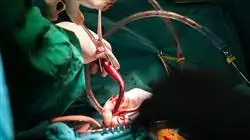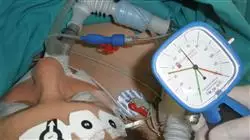University certificate
The world's largest faculty of medicine”
Introduction to the Program
The new scenarios in anesthesia procedures in critically ill patients motivate us to propose new training programs that meet the real needs of experienced professionals, so that they can incorporate advances in Cardiovascular Anesthesia management into their medical practice”

Anesthesiology, Resuscitation and Pain Therapy, as a medica-lsurgical specialty has undergone significant development in the last 20 years. Pharmacological and biotechnological advances, intraoperative and postoperative monitoring, imaging techniques and new paradigms of safety and multimodal management, as well as sub-specialization by specific areas, have contributed decisively to this transformation, and help reduce the patient morbidity and mortality.
Knowledge and understanding of cardiovascular physiology is one of the cornerstones of hemodynamic and global management for patients undergoing surgical and anesthetic procedures. Likewise, knowledge of the pathophysiological processes involved in the different cardiovascular pathologies and their impact during anesthesia is a basic principle for the safe practice of anesthesia in general. Moreover, the recognition of the different surgeries that specifically address the cardiovascular apparatus, the particular monitoring and medication used in these procedures and, of course, the integration of this information will help anesthesiologists acquire the necessary knowledge to deal with cardiovascular surgery.
In this Postgraduate certificate we aim to offer a global and continuous vision of the pre and intraoperative management of complex patients with cardiovascular pathology undergoing surgery. We have made a selection of the most frequent and complex procedures that require constant updating. There is also an introductory chapter on ventricular assist devices, which are of great importance at present and will play an significant role in the future. Lastly, we address the topic of multimodal rehabilitation applied to cardiac surgery, which is a very topical issue.rdamos el tema de la rehabilitación multimodal aplicada a la cirugía cardiaca, de destacada actualidad.
You will be able to learn, through the latest educational technology, the most recent advances in Cardiovascular Anesthesia”
This Postgraduate certificate in Cardiovascular Anesthesia is the most complete and up-to-date scientific program on the market. The most important features of the course are:
- Clinical cases presented by specialists in anesthesiology and other areas. The graphic, schematic, and eminently practical contents with which they are created, provide scientific and practical information on the disciplines that are essential for professional practice
- Real high-resolution images of pathologies, diagnostic imaging tests and guided procedures
- Presentation of practical workshops on procedures and techniques
- An algorithm-based interactive learning system for decision-making in the clinical situations presented throughout the course
- All of this will be complemented by theoretical lessons, questions to the expert, debate forums on controversial topics, and individual reflection assignments
- Content that is accessible from any fixed or portable device with an Internet connection
This Postgraduate certificate may be the best investment you can make when choosing a refresher program for two reasons: in addition to updating your knowledge of Cardiovascular Anesthesia, you will obtain a qualification from TECH Global University”
The teaching staff is made up of a team of leading anesthesiologists, who bring to this training the experience of their work, in addition to recognized specialists in other medical areas.
The multimedia content developed with the latest educational technology will provide the physician with situated and contextual learning, i.e., a simulated environment that will provide immersive training programmed to train in real situations.
This program is designed around Problem Based Learning, whereby the student must try to solve the different professional practice situations that arise during the course. For this reason, you will be assisted by an innovative, interactive video system created by renowned and experienced experts in the field of psychology with extensive teaching experience.
Incorporate the latest developments in Cardiovascular Anesthesia to your medical practice and improve patient prognosis"

It includes real clinical cases to bring medical practice as close as possible to the development of the program"
Why study at TECH?
TECH is the world’s largest online university. With an impressive catalog of more than 14,000 university programs available in 11 languages, it is positioned as a leader in employability, with a 99% job placement rate. In addition, it relies on an enormous faculty of more than 6,000 professors of the highest international renown.

Study at the world's largest online university and guarantee your professional success. The future starts at TECH”
The world’s best online university according to FORBES
The prestigious Forbes magazine, specialized in business and finance, has highlighted TECH as “the world's best online university” This is what they have recently stated in an article in their digital edition in which they echo the success story of this institution, “thanks to the academic offer it provides, the selection of its teaching staff, and an innovative learning method aimed at educating the professionals of the future”
A revolutionary study method, a cutting-edge faculty and a practical focus: the key to TECH's success.
The most complete study plans on the university scene
TECH offers the most complete study plans on the university scene, with syllabuses that cover fundamental concepts and, at the same time, the main scientific advances in their specific scientific areas. In addition, these programs are continuously being updated to guarantee students the academic vanguard and the most in-demand professional skills. In this way, the university's qualifications provide its graduates with a significant advantage to propel their careers to success.
TECH offers the most comprehensive and intensive study plans on the current university scene.
A world-class teaching staff
TECH's teaching staff is made up of more than 6,000 professors with the highest international recognition. Professors, researchers and top executives of multinational companies, including Isaiah Covington, performance coach of the Boston Celtics; Magda Romanska, principal investigator at Harvard MetaLAB; Ignacio Wistumba, chairman of the department of translational molecular pathology at MD Anderson Cancer Center; and D.W. Pine, creative director of TIME magazine, among others.
Internationally renowned experts, specialized in different branches of Health, Technology, Communication and Business, form part of the TECH faculty.
A unique learning method
TECH is the first university to use Relearning in all its programs. It is the best online learning methodology, accredited with international teaching quality certifications, provided by prestigious educational agencies. In addition, this disruptive educational model is complemented with the “Case Method”, thereby setting up a unique online teaching strategy. Innovative teaching resources are also implemented, including detailed videos, infographics and interactive summaries.
TECH combines Relearning and the Case Method in all its university programs to guarantee excellent theoretical and practical learning, studying whenever and wherever you want.
The world's largest online university
TECH is the world’s largest online university. We are the largest educational institution, with the best and widest online educational catalog, one hundred percent online and covering the vast majority of areas of knowledge. We offer a large selection of our own degrees and accredited online undergraduate and postgraduate degrees. In total, more than 14,000 university degrees, in eleven different languages, make us the largest educational largest in the world.
TECH has the world's most extensive catalog of academic and official programs, available in more than 11 languages.
Google Premier Partner
The American technology giant has awarded TECH the Google Google Premier Partner badge. This award, which is only available to 3% of the world's companies, highlights the efficient, flexible and tailored experience that this university provides to students. The recognition as a Google Premier Partner not only accredits the maximum rigor, performance and investment in TECH's digital infrastructures, but also places this university as one of the world's leading technology companies.
Google has positioned TECH in the top 3% of the world's most important technology companies by awarding it its Google Premier Partner badge.
The official online university of the NBA
TECH is the official online university of the NBA. Thanks to our agreement with the biggest league in basketball, we offer our students exclusive university programs, as well as a wide variety of educational resources focused on the business of the league and other areas of the sports industry. Each program is made up of a uniquely designed syllabus and features exceptional guest hosts: professionals with a distinguished sports background who will offer their expertise on the most relevant topics.
TECH has been selected by the NBA, the world's top basketball league, as its official online university.
The top-rated university by its students
Students have positioned TECH as the world's top-rated university on the main review websites, with a highest rating of 4.9 out of 5, obtained from more than 1,000 reviews. These results consolidate TECH as the benchmark university institution at an international level, reflecting the excellence and positive impact of its educational model.” reflecting the excellence and positive impact of its educational model.”
TECH is the world’s top-rated university by its students.
Leaders in employability
TECH has managed to become the leading university in employability. 99% of its students obtain jobs in the academic field they have studied, within one year of completing any of the university's programs. A similar number achieve immediate career enhancement. All this thanks to a study methodology that bases its effectiveness on the acquisition of practical skills, which are absolutely necessary for professional development.
99% of TECH graduates find a job within a year of completing their studies.
Postgraduate Certificate in Cardiovascular Anesthesia
.
Enhance your career in the field of cardiovascular health with the Postgraduate Certificate in Cardiovascular Anesthesia from TECH Global University of Technology! Take advantage of our online classes and gain the knowledge you need to become an Postgraduate Certificate in cardiovascular anesthesia. At TECH Global University we understand the importance of the attention and care of patients with cardiovascular pathologies, and that is why we have designed this specialized Postgraduate Certificate. Through our online classes, you will be able to access the content from anywhere and at any time, adapting it to your needs and schedule. This Postgraduate Certificate will provide you with the theoretical and practical fundamentals necessary for the safe and effective management of anesthesia in cardiovascular surgeries. You will be supported by Postgraduate Certificates in the field who will guide you through the Postgraduate Certificate and answer all your questions, providing you with an enriching and personalized learning experience.
Specialize in cardiovascular anesthesia
.
During the program, you will learn about the particularities of anesthesia in cardiovascular procedures, including the management of hemodynamic monitoring, the use of specific anesthetic drugs and myocardial protection techniques. You will acquire the skills necessary to prevent and manage potential intraoperative and postoperative complications in this type of surgery. In addition, you will explore the latest research and advances in the field of cardiovascular anesthesia, becoming familiar with the most advanced techniques and perioperative management protocols. All this will enable you to provide quality care and safety to patients undergoing cardiac surgery. Upon completion of the Postgraduate Certificate, you will obtain a recognized certificate that will support your knowledge and skills in the field of cardiovascular anesthesia. This program will open up new career opportunities and allow you to stand out in a highly demanded and specialized field in the healthcare field. Don't miss the opportunity to expand your knowledge and enhance your career in the area of cardiovascular anesthesia. Enroll in the Postgraduate Certificate in Cardiovascular Anesthesia at TECH Global University and become an Postgraduate Certificate in this crucial field for cardiovascular health.







